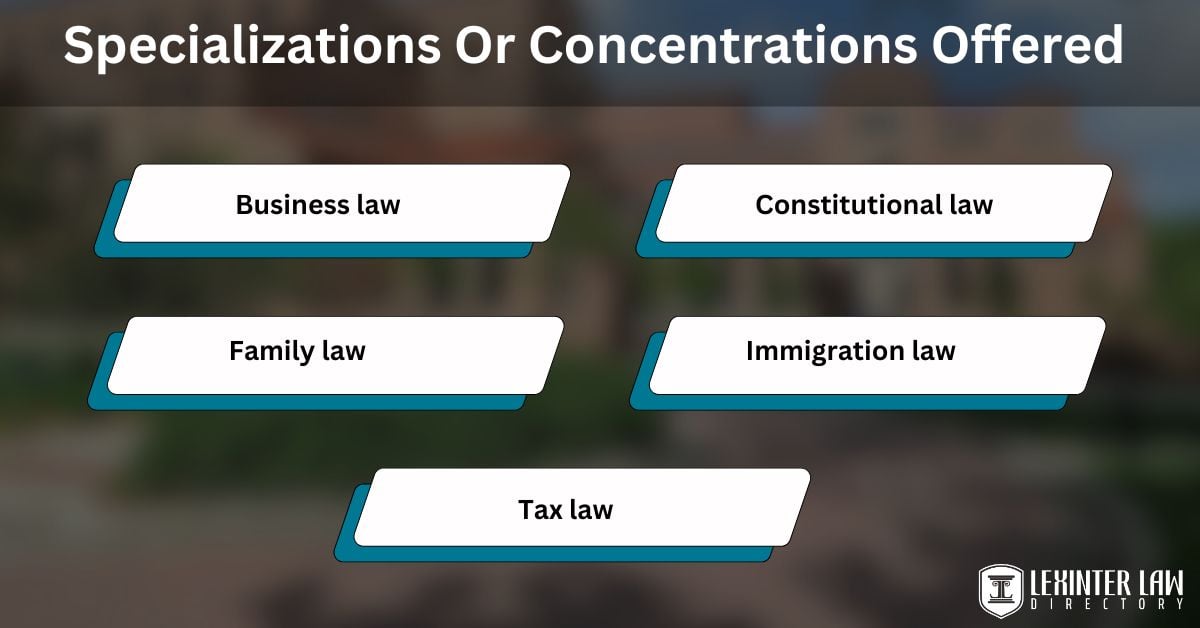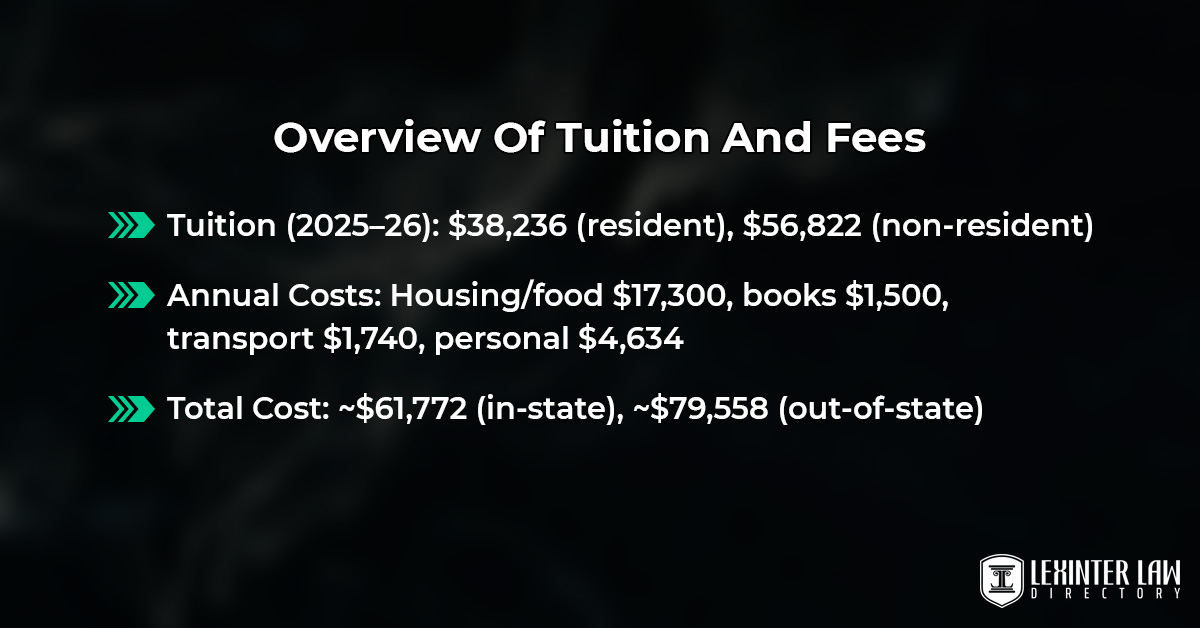University Of Texas At Austin School Of Law: Admissions, Tuition, And Rankings
The University of Texas at Austin School of Law is one of the oldest and most respected law schools in the American West. Established in the late 1800s, it began as a small program with a big vision. Over time, it has evolved into a well-known institution where students from across the country come to learn the foundations of law and prepare for meaningful legal careers.
The law school has built a strong reputation through dedication to teaching, public service, and academic excellence. Its graduates have gone on to lead in courts, classrooms, government offices, and law firms. With experienced faculty, a supportive community, and a focus on real-world legal skills, the school continues to offer students a solid path toward becoming thoughtful, capable lawyers.
Table of Contents
Location And Facilities
The University of Texas School of Law is located in central Austin, Texas. It includes several buildings such as Townes Hall, Jones Hall, and the Connally Center, which provide modern spaces for teaching, research, advocacy, and student life.
Location Of The University Of Texas At Austin School Of Law
The University of Texas at Austin School of Law is located at 727 East Dean Keeton Street, Austin, Texas 78705. It sits within the main campus of the University of Texas at Austin, close to downtown. The setting provides students with access to courts, law firms, and government agencies located throughout the capital city.
Facilities In The Law School
The law school includes Townes Hall, Jesse H. Jones Hall and the Connally Center for Justice. Townes Hall holds the Tarlton Law Library, classrooms, and faculty offices. The Connally Center features the Susman Academic Center and the Eidman Courtroom for moot court and advocacy training.
The Tarlton Law Library spans multiple floors and contains over one million volumes. The David J. Beck Center offers help with legal writing, research, and oral advocacy. Students can also access technology services and printing resources through the Communications Center located in the academic commons.
Acceptance Rate
The University of Texas School of Law maintains a highly selective admissions process, reflecting its strong academic reputation and high standards. Applicants face rigorous competition across key areas, including test scores, grades, and extracurricular achievements.
Overview Of Recent Years’ Acceptance Rates
For the 2024–2025 academic year, the University of Texas School of Law had an acceptance rate of 15.6%. Out of 5,475 applicants, the school extended 854 offers. This highly selective rate reinforces the institution’s commitment to maintaining strong academic standards while admitting a talented and diverse group of future legal professionals.
The school enrolled 282 first-year students from those offers. This incoming class includes 151 men and 131 women. These figures highlight the law school’s continued success in attracting top-tier applicants. Its consistent selectivity has helped preserve its national reputation for academic excellence and competitiveness in legal education.
Factors That Influence Acceptance (LSAT Scores, GPA, Extracurriculars)
Three key components shape each applicant’s chances of admission. The first is the LSAT, where the median score is 171. The 25th percentile score is 167, and the 75th percentile is 172. These scores show how important strong reasoning and analytical skills are in getting into the school.
The second factor is the GPA, with a median of 3.89. Students in the 25th percentile had a 3.74, while those in the 75th percentile had a 3.97. The third factor is involvement outside the classroom. Activities like leading a student group or volunteering show leadership, responsibility, and a strong interest in the law.
Tips For Prospective Students On Improving Their Chances Of Admission
To stand out, students should aim for high grades during college. A strong GPA will help your application stay competitive. Taking the LSAT seriously is also essential—scoring in the school’s target range boosts your chances. Many students benefit from using test prep classes or one-on-one tutoring for support.
Joining student groups or doing community work shows that you care about others and can take on responsibility. Your personal statement should explain why the law is important to you—be clear, honest, and avoid mistakes. Ask professors or employers to write strong recommendation letters that describe your strengths and character well.
Ranking
The University of Texas at Austin School of Law ranks among the best in the country. Its placement in national rankings reflects academic quality, student outcomes, and selectivity. It remains the top-ranked law school in Texas.
Current Ranking In U.S. News & World Report And Other Notable Publications
In the 2025 edition of U.S. News & World Report, the University of Texas School of Law is ranked 14th in the country. It shares this rank with Georgetown, Vanderbilt, and Washington University in St. Louis. Among law schools in Texas, it holds the top spot statewide.
Other legal publications also rank the school highly. The National Jurist placed it at No. 17, as did Above the Law. Bloomberg Law ranked the school at No. 16. These consistent national rankings highlight the school’s strong academic programs, experienced faculty, and success in preparing students for legal careers.
Historical Ranking Trends
The school has maintained a top national ranking over the years. While specific placement may shift slightly, it consistently ranks among the top 20 law schools in the country. These stable rankings show that the school delivers high-quality education, attracts strong applicants, and offers valuable legal career outcomes.
In the most recent rankings cycle, the school improved its standing to No. 14. This reflects better Bar passage rates, stronger employment outcomes, and continued investment in student resources. The rise also shows how the school competes with other elite institutions and maintains a leading position in legal education.
Factors Contributing To Its Ranking
Several strengths support the school’s high national ranking. These include a rigorous curriculum, nationally recognized faculty, and a first-time Bar passage rate of 94%. The student-to-faculty ratio is 6.2:1, allowing for small classes and personalized instruction that promote deeper learning and academic growth.
Graduates of the school consistently secure strong job placements. Students benefit from an expansive law library, career support services, and hands-on learning opportunities like clinics and externships. These resources prepare students for real-world legal work and make the law school one of the top destinations for aspiring lawyers in the U.S.
Curriculum And Specializations
The University of Texas at Austin School of Law provides an intensive three-year Juris Doctor program organized into fall and spring semesters. The curriculum balances foundational coursework, elective specializations, legal writing, research skills, and extensive experiential learning options.
Overview Of The J.D. Program And The Academic Calendar
The three-year J.D. program begins with foundational first-year courses such as contracts, criminal law, constitutional law, and civil procedure, taught by experienced faculty to develop core legal reasoning and analytical thinking. The academic year runs in fall and spring semesters, each lasting approximately 15 weeks, during which students typically take four to five courses, including required legal writing and research modules. Upper-level years allow customization through electives, joint-degree options, and summer classes. Academic calendars are published annually, detailing registration, holidays, add/drop deadlines, and exam periods.
Specializations Or Concentrations Offered

UT Austin Law offers J.D. students various academic tracks and concentrations in areas like business law, constitutional law, family law, immigration law, and tax law.
Students can also explore environmental law, public interest, and international law through specialized electives. Options to pursue dual degrees or take cross-university courses further enhance specialization opportunities.
Clinical Programs, Externships, And Other Hands-On Learning Opportunities
Students can gain practical experience through 17 in-house clinical programs—such as immigration, environmental, Supreme Court litigation, and disability rights clinics—working under faculty supervision on real cases. Eight externship opportunities allow placements with judges, government agencies, nonprofits, and legislative offices, including federal public defender and JAG Corps externships. Moot court teams, student law journals, Bar associations, and volunteer programs complement clinics and externships, preparing students for diverse legal careers.
Campus Life
The University of Texas at Austin School of Law offers a lively, student-centered environment. From professional groups to creative outlets, the campus is active year-round. Students build friendships, sharpen legal skills, and grow through meaningful engagement.
Overview Of Student Organizations, Journals, And Moot Court Competitions
UT Law features over 50 student organizations, including affinity groups, advocacy teams, and service clubs. These groups offer leadership and networking opportunities. Students contribute to multiple law journals, such as the Texas Law Review, deepening their legal research experience.
Moot court and mock trial competitions are also popular, helping students refine courtroom skills while competing nationally. These programs enhance confidence, critical thinking, and public speaking abilities.
Diversity And Inclusion Efforts And Demographics
The school promotes an inclusive, welcoming space for students of all backgrounds. The reputed law school supports diverse organizations like OUTLaw, CHLLSA, and first-generation groups. Students from underrepresented communities are strongly encouraged to apply and participate.
Around 46% of enrolled students are women, and 41% identify as minorities. Through policies, events, and scholarships, UT Law works to ensure equity, cultural awareness, and open dialogue across the student body.
Events, Guest Lectures, And Other Extracurricular Opportunities
Throughout the year, UT Law hosts conferences, symposiums, and guest speaker events featuring leading legal voices. These programs focus on topics like civil rights, constitutional law, and international policy.
Students also enjoy wellness activities, social mixers, and volunteer days. These experiences build community while helping students stay connected to current issues and opportunities outside the classroom.
Career Opportunities
The University of Texas at Austin School of Law offers excellent career outcomes. Students benefit from strong employer connections, professional guidance, and real-world experience. Most graduates find full-time, long-term roles shortly after completing their legal education.
Career Services And Resources Provided By The University
The Career Development Office at UT Austin Law provides students with one-on-one career counseling throughout law school. Staff members help students build strong resumes and cover letters while also preparing them for interviews. The office hosts workshops and networking events where students meet law firms, public agencies, and nonprofit employers. A private job board connects students with career opportunities, including summer positions, clerkships, and full-time legal roles after graduation.
Recent Employment Statistics
In 2025, the law school had 277 graduates. At the time of graduation, 85.9% of them were already employed. Ten months later, that number rose to 96.4% holding full-time, long-term positions. Most graduates worked as law firm associates, followed by judicial clerks, government attorneys, and in-house counsel. These employment numbers show that the school effectively prepares students for a variety of legal career paths.
Notable Alumni And Their Contributions To The Legal Field
UT Austin Law has produced many prominent alumni. Sandra Day O’Connor, the first female U.S. Supreme Court Justice, made history in the judiciary. Charles Alan Wright became one of the nation’s most cited legal scholars. Robert E. Keeton led in insurance law. William S. Sessions served as FBI Director. Ken Paxton, the current Attorney General of Texas, is also a graduate of the school.
Financial Information
The University of Texas at Austin School of Law provides transparent cost information to help students plan effectively. Tuition, fees, and living expenses vary depending on residency, with financial aid options available to offset costs and support a diverse student body.
Overview Of Tuition And Fees

For 2025–2026, resident tuition at The University of Texas at Austin School of Law is $38,236, and non‑resident tuition is $56,822. Additional annual costs include approximately $17,300 for housing and food, $1,500 for books, $1,740 for transportation, and $4,634 for personal expenses. The total estimated cost of attendance is around $61,772 for in‑state and $79,558 for out‑of‑state students.
Financial Aid Opportunities And Scholarships
The University of Texas at Austin School of Law offers substantial financial assistance. Over 93% of students receive scholarships, including merit-based and need-based grants funded by alumni. Awards range from several thousand dollars to full tuition coverage and renew over all three years. Students can also obtain federal loans, work-study, and emergency funding.
Tips For Budgeting And Managing Student Debt
Effective budgeting begins with tracking tuition, housing, and personal costs. Share housing to reduce expenses and watch discretionary spending. Graduates should consider loan consolidation or income-driven repayment to reduce interest. The school offers financial wellness counseling and emergency loans for students who face unexpected funding gaps. Planning ahead is key to managing debt successfully.
Frequently Asked Questions About The University Of Texas At Austin School Of Law
1. What Is The Minimum GPA For UT Austin Law School?
While there is no official GPA cutoff, successful applicants to the University of Texas at Austin School of Law typically have strong academic records. The median undergraduate GPA is 3.89, with most admitted students falling within the 3.74 to 3.97 percentile range.
2. What Is The University Of Texas At Austin Law School Ranked?
The University of Texas at Austin School of Law is ranked 14th nationally in the 2025 U.S. News & World Report rankings. It also holds the top spot among law schools in Texas, consistently placing in the Top 20 across major national publications such as Bloomberg Law and Above the Law.
Conclusion
The University of Texas at Austin School of Law began with a small class and a bold mission. Over the years, it has grown into one of the best law schools in Texas and a respected leader nationwide.
With its strong academics, outstanding Bar passage rates, and commitment to public service, the school equips students for real-world success. UT Law proves that with dedication, community, and purpose, a law school can shape not just careers but the future of justice itself.

